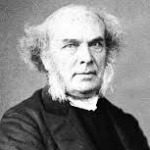Quotes about Jesus_Christ-Word
The “Word” is the eternal name for the young Child of Bethlehem. He is so called because He is the revealer of the Father, the exponent of Godhead. He is so now; He was so in the days of his flesh; He has been so from eternity. The names Christ, Immanuel, Jesus, are His earthly ones; His names in time connected with His incarnate condition; but the names “Word” and “Son” are expressive of His eternal standing, His eternal relationship to the Father. What He was in time and on earth, that same He has been in heaven and from eternity. The glory which He had “before the world was” (John 17:5), and of which He “emptied himself” (Phil. 2:7), was the glory of the eternal Word, the everlasting Son. As the eternal revealer of Godhead, the “brightness of Jehovah’s glory, and the express image of His person,” His name ever was THE WORD; as the declarer of the mind of God to man, His name is no less THE WORD, with this addition, “the Word made flesh.”
Christ is the Word of God. It is not in certain texts written in the New Testament, valuable as they are; it is not in certain words which Jesus spoke, vast as is their preciousness; it is in the Word, which Jesus is, that the great manifestation of God is made.
Christians need no other reason to be avid readers of the Word of God. Realizing that Scripture is “God-breathed” is motivation enough. Immediately, we see a connection between the living Word and the written Word. Just as Jesus Christ the living Word is an ever present and dynamic reality, the written Word is equally alive and active through the mind of the Holy Spirit. Every time we open the Scriptures, we should expect a personal encounter with the God-breathed Spirit of the living Word. This is reading at its very best. When the mind and spirit of a biblical author interact in vibrant dialogue with the mind and spirit of a reader, the highest purpose of the inspired Word is fulfilled. We should soar every time we read the Word of God.
How to Read a Christian Book, 2001, p. 18- 19. Used by permission of Baker, a division of Baker Book House Company.
“The Word (i.e., Jesus) is what matters, not the Word (i.e., the Bible).” As pious as that sounds, it takes a different view of the Word than the Word Himself. Jesus repeatedly quotes the Bible as completely trustworthy and as His final authority.
Scripture – How the Bible is Like No Other by Andy Naselli, taken from Don’t Call it a Comeback, edited by Kevin DeYoung, copyright 2011, Crossway Books, a division of Good News Publishers, Wheaton Illinois 60187, www.crosswaybooks.org, p. 68.



